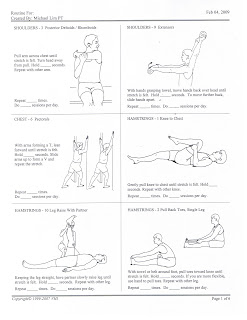Just Breathe
One of the most fundamental, automatic and essential actions that we all have in common is that we must breathe in order to survive. Other than needing to drink water, breathing is the most important thing we do to sustain life. Breathing fills the lungs with oxygen in order to deliver its benefits to certain areas of the body that need it, it also rids the body of carbon dioxide (which could cause the following if too much of it was kept in our bodies: dizziness, headaches, visual and hearing dysfunction, and unconsciousness). In addition to releasing the carbon dioxide, breathing also depletes our water reserve, hence the drinking of water being so important. The circulation of the blood is also initiated with every breath and this allows for normal function of the body.
So it's no surprise that in many coping and relaxation techniques you are first asked to take a deep breath. This "time out" from a busy schedule or a frustrating commute home is a very effective way to replenish a sense of calm since you become aware of your present time when you consciously pay attention to your breath. Unconscious breathing on the other hand is simply regulated for what the body needs at that time. However, being aware of your breathing brings you back in the control seat of what you give your body, such as a relaxed or aroused state (whatever is your thing). That is why meditation, such as in yoga, a person becomes most aware of their breathing and this creates a sense of being in control of oneself.
Lets take for example the idea that you're in your car and someone who doesn't properly use their signal indicators makes you really mad. You take a deep breath. Once you've taken the focus away from what has upset you it no longer feels as important and balance can be restored. Reacting quickly and not taking that moment to breathe may lead to shouting out loud (to someone who can't even hear you), not properly paying attention to the road and other drivers (which could be hazardous), and lead to an accident that wasn't even the non-signaler's fault. Would that really be worth it?
This is not to suggest that every time we breathe we should be aware of it, but the action itself, not only because it sustains life, is a gift that we all have the opportunity to explore and cherish.
http://www.youtube.com/watch?v=JdUpxch4F8M
So it's no surprise that in many coping and relaxation techniques you are first asked to take a deep breath. This "time out" from a busy schedule or a frustrating commute home is a very effective way to replenish a sense of calm since you become aware of your present time when you consciously pay attention to your breath. Unconscious breathing on the other hand is simply regulated for what the body needs at that time. However, being aware of your breathing brings you back in the control seat of what you give your body, such as a relaxed or aroused state (whatever is your thing). That is why meditation, such as in yoga, a person becomes most aware of their breathing and this creates a sense of being in control of oneself.
Lets take for example the idea that you're in your car and someone who doesn't properly use their signal indicators makes you really mad. You take a deep breath. Once you've taken the focus away from what has upset you it no longer feels as important and balance can be restored. Reacting quickly and not taking that moment to breathe may lead to shouting out loud (to someone who can't even hear you), not properly paying attention to the road and other drivers (which could be hazardous), and lead to an accident that wasn't even the non-signaler's fault. Would that really be worth it?
This is not to suggest that every time we breathe we should be aware of it, but the action itself, not only because it sustains life, is a gift that we all have the opportunity to explore and cherish.
http://www.youtube.com/watch?v=JdUpxch4F8M

Comments
Post a Comment